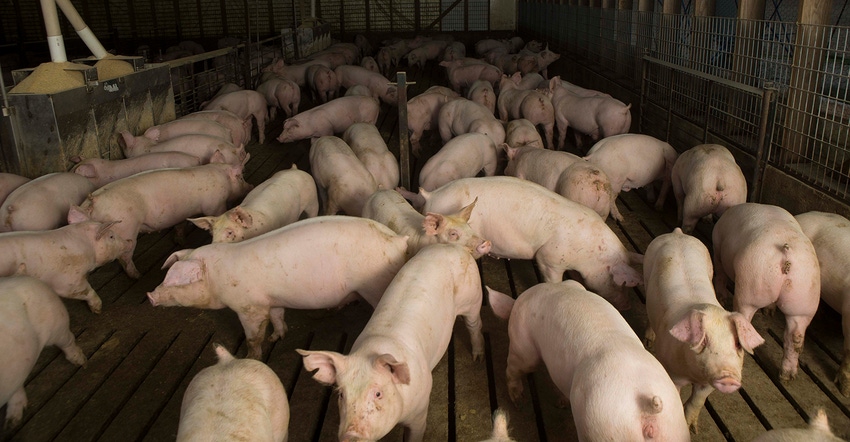RELIEF for producers forced to euthanize livestock
Legislative Watch: Help for euthanizing livestock; RAMP-UP meat facilities; ag appropriations moving forward; call for price reporting hearings.

The "Responding to Epidemic Losses and Investing in the Economic Future for Producers Act of 2020" would compensate livestock and poultry producers who have had to euthanize or donate animals because of the coronavirus pandemic.
The bill:
"Would provide assistance to producers who had to euthanize livestock due to lack of access to processing facilities.
Livestock value would be calculated based on the national average market value between March 1 and the date of enactment.
Reimbursements would be calculated for a 30-day period beginning with the date of initial depopulation, producers will get 85% of the value of losses.
Each 30-day period after that, the value of losses would be reduced by 10%."
It also amends the Commodity Credit Corp. charter to deal with the removal and disposal of livestock and poultry due to supply chain interruption during a public health emergency. This will qualify a pandemic national emergency for CCC funding in the future.
Howard "A.V." Roth, president of the National Pork Producers Council says, "The RELIEF for Producers Act provides a much-needed lifeline to thousands of farmers who could otherwise go out of business, leading to consolidation and contraction of the U.S. pork industry. We urge Congress to work together to quickly pass much-needed legislation addressing this crisis."
Sponsors of the bill are Sens. Jim Inhofe (R-OK), Richard Burr (R-NC), Joni Ernst (R-IA), Chuck Grassley (R-IA) and Thom Tillis (R-NC).
Upgrading meat facilities to federal inspection
A bipartisan group of 10 Congressional members led by Congressmen Collin Peterson (D-MN), chairman of the House Agriculture Committee, and Frank Lucas (R-OK) have introduced legislation to establish a program that would enable existing meat and poultry processing facilities to upgrade in order to become a federally inspected facility. This would allow them to ship product across state lines.
The "Requiring Assistance to Meat Processors for Upgrading Plants" establishes a matching grant program for meat and poultry processing facilities. The grants can be used to fund planning activities, facility upgrades or other improvements required to become a federally inspected establishment. The grants cannot exceed $100,000 and must be matched on a one-to-one basis (requirement waived for fiscal year 2020 and 2021).
If the facility fails to become a federally inspected establishment within three years, the grant must be repaid. The bill provides $80 million in mandatory money for the period of fiscal years 2021-23 for USDA's Agricultural Marketing Service to operate the program, plus an authorization of $20 million for each of those years.
Those supporting the RAMP-UP Act include the American Farm Bureau Federation, American Sheep Industry Association, Consumer Reports, National Cattlemen's Beef Association, National Farmers Union and National Pork Producers Council.
FY '21 agriculture appropriations moving forward
The House Appropriations Committee approved its fiscal year 2021 agriculture appropriations bill yesterday by voice vote. The bill provides $153 billion in both discretionary and mandatory funding, an increase of $331 million over FY '20.
Total discretionary funding is $23.98 billion which is an increase of $487 million over the last fiscal year.
The bill blocks USDA's Food Safety and Inspection Service from granting line speed waivers at meat processing facilities while the COVID-19 pandemic is ongoing. It also requires USDA to revoke any line speed waivers issued during the pandemic. However, a waiver may be issued if the plant agrees to an Occupational Safety and Health Administration inspection and OSHA certifies to FSIS that any increases in line speed would not have an adverse impact on worker safety.
The USDA is blocked from implementing the administration's restrictions on the Supplemental Nutrition Assistance Program's benefits and eligibility.
The bill continues the prohibition on the use of imported Chinese chicken in the school lunch and breakfast programs and the Summer Feeding Program, and it rejects the administration's proposed cuts and elimination of international food assistance programs.
The House of Representatives will consider the bill later this month. The Senate Agriculture Appropriations Subcommittee has yet to set a date for when it will consider an appropriations bill.
Calling for MPR hearings
With the Mandatory Price Reporting program expiring on Sept. 30, the National Farmers Union and U.S. Cattlemen's Association are calling on the Senate Agriculture Committee to hold a hearing on the program.
In a letter to the committee, they say, "The U.S. livestock industry requires bold leadership and fresh ideas to address the current inadequacies in the marketplace" and "today's marketplace lacks the transparency and true price discovery indicative of a healthy industry."
MPR was established in 1999, and mandates price reporting for slaughter cattle, swine, sheep, boxed beef, lamb meat and wholesale pork.
Source: P. Scott Shearer, who is solely responsible for the information provided, and wholly owns the information. Informa Business Media and all its subsidiaries are not responsible for any of the content contained in this information asset.
About the Author(s)
You May Also Like



